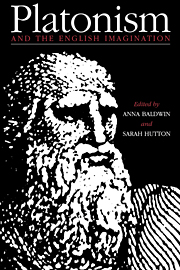Book contents
- Frontmatter
- Contents
- Notes on contributors
- Preface
- I ANTIQUITY
- II THE EARLY CHRISTIAN PERIOD AND THE MIDDLE AGES
- III THE RENAISSANCE AND THE SEVENTEENTH CENTURY
- IV THE EIGHTEENTH CENTURY
- V THE NINETEENTH CENTURY
- 18 Introduction
- 19 Recollection and Recovery: Coleridge's Platonism
- 20 Wordsworth's Ode on the Intimations of Immortality
- 21 Shelley, Plato and the political imagination
- 22 Arnold, Plato, Socrates
- 23 Flux, rest and number: Pater's Plato
- VI THE TWENTIETH CENTURY
- Bibliography
- Index
21 - Shelley, Plato and the political imagination
Published online by Cambridge University Press: 15 December 2009
- Frontmatter
- Contents
- Notes on contributors
- Preface
- I ANTIQUITY
- II THE EARLY CHRISTIAN PERIOD AND THE MIDDLE AGES
- III THE RENAISSANCE AND THE SEVENTEENTH CENTURY
- IV THE EIGHTEENTH CENTURY
- V THE NINETEENTH CENTURY
- 18 Introduction
- 19 Recollection and Recovery: Coleridge's Platonism
- 20 Wordsworth's Ode on the Intimations of Immortality
- 21 Shelley, Plato and the political imagination
- 22 Arnold, Plato, Socrates
- 23 Flux, rest and number: Pater's Plato
- VI THE TWENTIETH CENTURY
- Bibliography
- Index
Summary
Shelley (1792–1822) has traditionally been considered the most ‘Platonist’ of all the Romantic poets. Indeed, James Notopoulos devoted a whole book to Platonism in Shelley, arguing for a natural affinity between the ancient philosopher and the Romantic poet and claiming that ‘Shelley is the most outstanding Platonist in the Platonic renascence of the Romantic period’. And Edward Dowden, the poet's first authorised biographer, spoke for many later critics when he wrote that Shelley ‘felt the radiance and breathed the air of Plato's genius as though he were himself a scholar in the garden at Colonus’.
Shelley has been hailed as the Romantic poet most influenced by Plato partly because, unlike the others, he not only read Plato extensively but actually translated him. Some of his translations are only fragmentary. Scattered lines from Republic II and III appear in his notebooks, as well as short passages from the Menexenus and the Phaedo. These constitute working translations conveying ideas which particularly arrested him in his reading and which chimed with his own thoughts. Other translations, however, are complete and obviously intended for publication. He translated the Ion in 1821. And three years earlier he produced a complete version of the Symposium, together with a lengthy preface to explain the strange Greek custom of homosexuality to the Greekless reader:
There is no book which shows the Greeks precisely as they were; they seem all written for children … But there are many to whom the Greek language is inaccessible, who ought not to be excluded by this prudery to possess an exact and comprehensive conception of the history of man.
- Type
- Chapter
- Information
- Platonism and the English Imagination , pp. 229 - 241Publisher: Cambridge University PressPrint publication year: 1994



